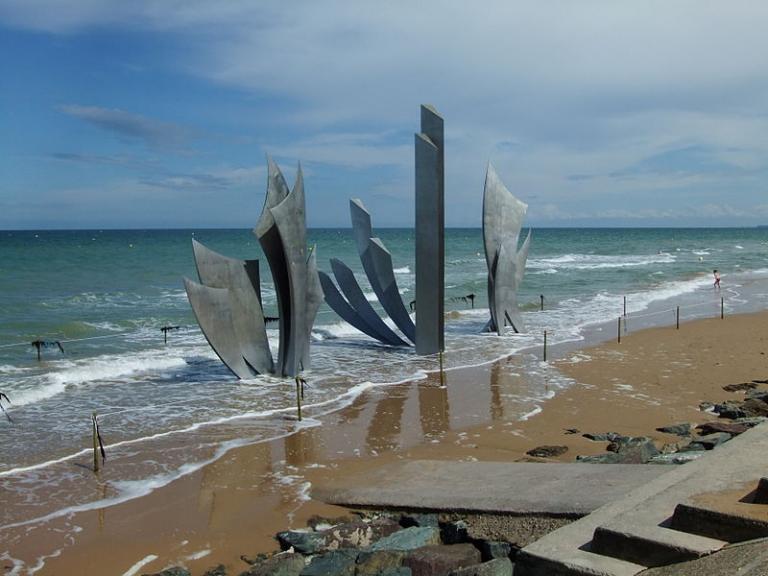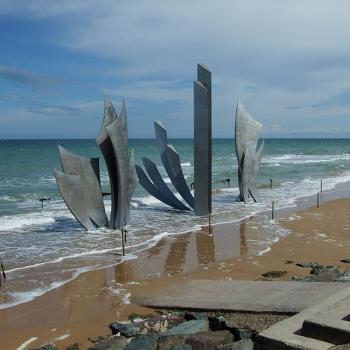
Ever since Tom Brokaw coined the term the “Greatest Generation” to refer to the men who fought World War II and the men and women who supported them on the home front, we’ve developed this mythology that these young men (because, let’s face it, the Rosie the Riveter stories don’t have that same element of heroism, and are just as likely to celebrate the employment of women in factory jobs as a step towards greater women’s rights and economic independence rather than hardship endured as service to country) achieved something extraordinary because they came from a society that has encouraged such self-sacrifice, which has since vanished.
We mock the young men of today with memes that put photos of men rushing from a troop transport onto the beaches side-by-side with a college student today with a man bun, engaging in some activity that’s the epitome of snowflakedom, whether it’s pre-college-finals coloring books, or a protest sign demanding free tuition, or the infamous pajama boy, on his parents’ health insurance ’til age 26.
Here are a few thoughts:
First, it is true that young men today, on average, have significantly fewer handyman-type skills. The young men at Normandy were far more likely to have grown up on farms, or as sons of factory workers. My own father was of the next generation — his dad was of draft age but working in an “important-to-the-war-effort” job — and had so much experience working with his hands in his childhood/teen years (in his early years, working on the small family farm just outside Denver, then, in his teen years, building houses when they subdivided the land as suburbanization came, as well as acquiring and repairing a series of cars) that when he entered the army after college/ROTC, he used those skills supervising a vehicle repair depot at the age of 24. My husband’s father was an actual master carpenter, and my husband learned basic home repair and woodworking skills from him. And he’s tried to pass on those skills to our kids, but it’s a lot harder when, simply to free up time for other things, we’re more likely to call a professional (not to mention that the basic car repair that a prior generation of teens might have learned, such as oil changes, just can’t be done at home any longer). Add in another generation, and we’re talking about kids who don’t have these basic skills — not because they’re pathetic snowflakes but because they grew up in homes with several generations of college graduates behind them. Does that have anything directly to do with heroism? No, but my gut sense says that it matters anyway.
Second, the heroism of D-Day was preceded by 2 1/2 years of training — and this matters. (OK, I admit that I am not, for the purposes of this blog post, looking up neither the details of how many men were drafted before Pearl Harbor and how quickly the full wartime military was built up after Pearl Harbor, nor the numbers of for how many soldiers this was the first time they saw battle.) The many impressive acts of heroism did not simply emerge from the character-building of American farm life, or from the moral goodness of American democracy or from Americans as a character trait (whatever you might deem to be its origins — the American Revolution, the immigrant experience, a desire on the part of descendant slaves to protect others from tyranny). What’s more, let’s face it, a GI on the beaches of Normandy didn’t really have a heck of a lot of choice in the matter, with respect, at least, to the basic actions of “move forward and risk death, or fail to do so, and die,” and many of the astounding stories are about men demonstrating leadership and organizing groups of men in the chaos (particularly at Omaha Beach), and in my post this time last year, I marveled at the degree to which men were selected to be leaders and trained for the task and how much it mattered, in contrast to the fluff we call “leadership” now, when we simultaneously want every high school person to ‘be a leader.”
And, yes, prior to Pearl Harbor, had we not known how the rest of it all would turn out, we might well have called politicians and activists and ordinary Americans “snowflakes” as American public opinion opposed American entry into the war (from both the Right and the Left, what with the Soviet Union being allied with Germany until June of ’41), though, again, I’m having difficulty finding specifics in a quick online search, except for articles observing that Roosevelt himself understood and was at work preparing Americans for the reality of a need for intervention sooner or later, in 1940. Is it fair to compare the youth of today with the men of 1944, ready for battle, rather than the men of 5 years earlier?
All of which is not even to mention the stories of young men in the military today. Not only is our army all-volunteer, but, unlike the men of the Cold War told that military service was “be all that you can be” and an opportunity to see the world, they know there’s a good chance they’ll be in harm’s way.
So my point is not to cheapen the sacrifices made by men 75 years ago so much as to say that the young men and women of today might well be capable of just as much heroism should similar circumstances befall us in the future. And, yes, I say that as a mother of three boys, one each at each of the stages of pre-teen, teenager, and young adult.
Image: https://commons.wikimedia.org/wiki/File:M%C3%A9morial_omaha_beach,_plage_de_normandie.jpg; By Woolfer [CC BY-SA 3.0 (https://creativecommons.org/licenses/by-sa/3.0)], from Wikimedia Commons












